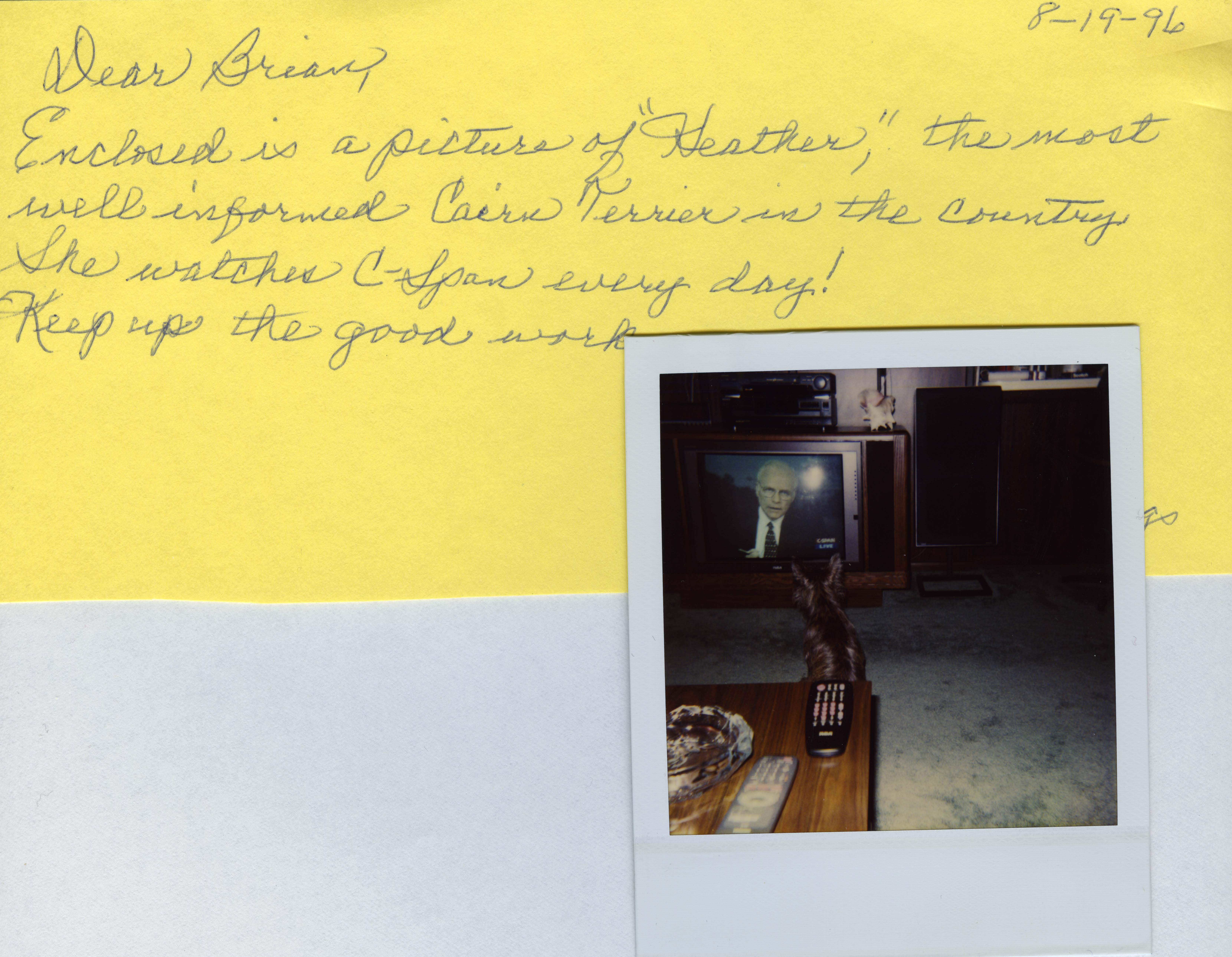This post was written by Brandan Culbert.
Being an archivist is fun… if you like to read other people’s mail.
As an archival assistant, my role consists of reading letters and inputting corresponding information– it sounds mundane but is rather exciting. The current letters I am working on is C-SPAN’s viewer fan mail. If you haven’t heard of C-SPAN, it is a broadcasting network that stands for “Cable-Satellite Public Affairs Network.” Essentially, C-SPAN’s primary focus is broadcasting congressional proceedings and other government related affairs without having a lot of “spin.” Usually this explanation is followed by “but what does C-SPAN have to do with George Mason University?” The reason for this is the SCRC does not collect only things related to Mason, but things which include the history of the larger region and government. I say that Mason is lucky to have the collection because the letters are an especial treasure-trove of niche entertainment.
There’s an old proverb about opinions -everyone has one- and viewer mail is no exception. The letters range from “I love your network! Here’s a photo of my pet!” to Holocaust conspiracies and whatever flows into the viewer’s stream of consciousness. Today, I think it would be a fun journey to have a look at a few of the various types of letters indexed.

This is one of many love letters I’ve encountered from this viewer and a welcome addition to my permanent memory. Once in a blue moon, I’ll come across a letter that makes me wonder “why?” Often her letters will consist of harmless information such as “I’m 5’2” and “I have great social security,” you know, usual courtship queries.
From the delicate prose and spectacular declarations of love, you can feel the personal disappointment she experiences that she cannot be with the man she loves. A tale as old as time.
Reading letters from star-struck individuals is good fun; however, love letters are the needles in the haystacks that are hate-mail. It’s more likely to encounter mail denouncing Brian Lamb as politically biased, ranting about journalists, or complaining that Congress is incompetent (though they often propose solutions on how to fix the issue, even if those solutions are questionable.)

Sometimes I encounter a wholesome letter such as this one! It’s rare –but always appreciated- when I find a photo of a pet. This is just an example of a straight-forward “thank you” with a photo of their terrier watching C-SPAN

Most of the letters I encounter are similar to this in length. At times the difficulty with collecting metadata is having to read through and summarize the given information. Sometimes the information is incoherent, illegible, or there’s simply too much discussed; nevertheless, it’s my job as an archival assistant to condense as much as possible for ease of public accessibility.
At times it is difficult because this letter is five pages worth of content addressing fascism, capitalism, racism, (and even more –isms). It’s impossible to always understand the context surrounding the discussion but that can be remedied through research. For example, did you know who Ross Perot was? I had to learn a lot about his independent run as President in 1992. Not only are archivists inputting data, they are doing the research necessary to accurately summarize the content.
It’s an arduous process that requires intense attention to detail and a lot of time; that’s why digitization projects can span several months.
In the archives there is always something new awaiting discovery. It can be a fun process and you can find a lot of interesting material, but to my surprise when I first started, it requires a substantial amount of diligence and focus. But what’s the purpose of having a collection of primary sources with no means of locating specific content? The job of an archivist is not only to store and digitize information, but to make information easily accessible for the public. Processing files, indexing names and dates, digitizing, and creating finding aids helps do just that.
I appreciate the C-SPAN collection because it provides an excellent insight into the psyche and experiences of people throughout the country during tumultuous periods in history: The Clarence Thomas hearings, the War on Drugs, Iraq’s invasion of Kuwait, and the Gulf War. Although I spend most time reading letters with enough information on a page to fill an encyclopedia entry, its nonetheless still important information. Working in the archival field can be rewarding and exciting— provided that you love to read other people’s mail.
Follow Special Collections Research Center on Social Media at our Facebook, Instagram, and Twitter accounts. To search the collections held at Special Collections Research Center, go to our website and browse the finding aids by subject or title. You may also e-mail us at speccoll@gmu.edu or call 703-993-2220 if you would like to schedule an appointment, request materials, or if you have questions. Appointments are not necessary to request and view collections.


